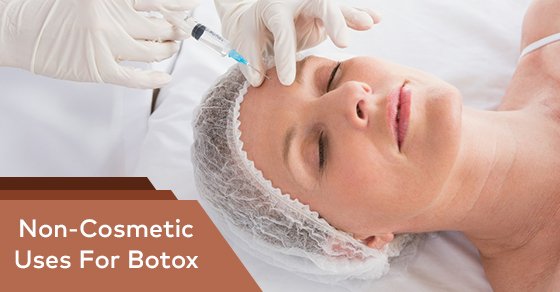Many people are quick to assume that Botox is strictly for cosmetic purposes. This is in fact, a false assumption.

Botox, also referred to as Botulinum toxin, is used not only in a variety of cosmetic procedures, but medical procedures as well. Countless medical professionals, including dentists, use Botox as a cure for certain medical issues, often for concerns related to the jaw joint and facial muscles such as temporomandibular disorders (TMD).
Common Non-Cosmetic Uses
- Stopping Chronic Sweating
- Controlling Muscle Spasms (for example, jaw clenching and grinding associated with bruxism)
- Curing Migraines or Severe Headaches (if your headaches are bite- or jaw-related, see how Invisalign may help)
- Correcting Lazy Eye
- Correcting Facial Paralysis (Bell’s Palsy)
- Soothing Neck Pain and Muscle Contractions (Spasmodic Torticollis)
- Preventing Involuntary Urine Leakage
- Preventing Involuntary Blinking of the Eyes (Blepharospasm)
Botox is said to cure or help improve the above conditions. Of course, it is used for cosmetic reasons to, but the medicinal aspects of the injection are more favorable among dental physicians.
How Botox Works and How It Is Injected
When Botox is used to help treat or improve a medical problem, the area in which the problem exists is usually where the injection is made. Botox is a neurotoxin and a protein that causes paralysis to the area in which the toxin is administered. The toxin causes the muscles in the area to relax, which then releases the pain caused to the area. In cases like TMJ disorder, relaxing overactive jaw muscles can help reduce pain and improve function.
When it comes to other medical issues resolved with Botox, such as excessive sweating, the injection has other ways of calming the symptoms. It has become a more frequently offered injection by dentists with the special training and certification to administer Botox to their patients.
Botox provides many benefits to those who choose to have it done whether for cosmetic or medical purposes, but it is important that Botox is only practiced by those with the proper training to do so. Otherwise, serious complications could occur.
Botox is an effective way to cure many medical issues, especially problems in areas of the body that experience muscles spasms. While all of the medical uses for Botox are yet to be discovered, there are many common issues it can resolve.
That is just another reason for dentists to offer the treatment to their patients. When explaining to your dentist all of the problems you’re experiencing that Botox could possibly cure, or simply wanting it for cosmetic purposes, ask questions about the success rate of the treatments. If your symptoms involve the jaw joint, you may also want to explore whether full-mouth restoration can help TMJ. You can ask any questions you might have during the initial appointment and your dentist will be happy to answer.